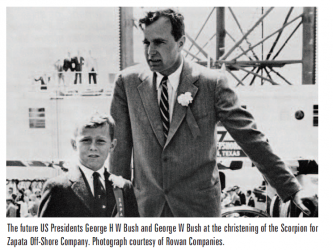Difference between revisions of "Zapata Petroleum"
(SEC records 'lost') |
(duplicate copies found by kwitny) |
||
| Line 26: | Line 26: | ||
==Lost records== | ==Lost records== | ||
| − | Zapata's filing records with the U.S. [[Securities and Exchange Commission]] are intact for the years 1955–1959, and again from 1967 onwards. However, records for the years 1960–1966 are missing. The commission's records officer stated that the records were inadvertently placed in a session file to be destroyed by a federal warehouse, and that a total of 1,000 boxes were pulped in this procedure. The destruction of records occurred either in October 1983 (according to the records officer), or in 1981 shortly after Bush became [[Vice President of the United States]] (according to, Wison Carpenter, a record analyst with the commission).<ref>Jonathan Kwitny, "The Mexican Connection: A look at an old George Bush business venture", ''Barron' | + | Zapata's filing records with the U.S. [[Securities and Exchange Commission]] are intact for the years 1955–1959, and again from 1967 onwards. However, records for the years 1960–1966 are missing. The commission's records officer stated that the records were inadvertently placed in a session file to be destroyed by a federal warehouse, and that a total of 1,000 boxes were pulped in this procedure. The destruction of records occurred either in October 1983 (according to the records officer), or in 1981 shortly after Bush became [[Vice President of the United States]] (according to, Wison Carpenter, a record analyst with the commission). After [[Jonathan Kwitny]] unearthed duplicate copies elsewhere, Bush admitted through a spokesman a brief business relationship with [[Jorge Diaz Serrano]], which he claimed lasted just 7 months, yet which the duplicate SEC filings made clear in fact lasted 4 years. They also established that the relationship involved both breaking Mexican law and keeping US shareholders in the dark about the deal - a violation of US law.<ref>[[Jonathan Kwitny]], "The Mexican Connection: A look at an old George Bush business venture", ''[[Barron]]'''s September 19, 1988. Cited with further discussion by [[Russ Baker]], ''[[Family of Secrets]]'' (New York: Bloomsbury Press, 2009) pp. 37 and 505.</ref> |
| − | |||
{{SMWDocs}} | {{SMWDocs}} | ||
Revision as of 08:05, 29 July 2016
 | |
| Formation | 27 March 1953 |
| Founder | • • • • • Thomas J. Devine |
| Type | front |
| A front company started by George Bush Sr. | |
Zapata Oil was an oil exploration business set up by George H. W. Bush which was never notably profitable in the usual commercial sense, and seems to have worked more as a front for a range of espionage and covert operations.
Origins
The company was started with assistance from Allen Dulles and (fellow bonesmen) H. Neil Mallon and Bush's maternal uncle, Herbert Walker, an investment banker, who put up the capital. Walker was instrumental in bringing in others such as Eugene Meyer (owner of the Washington Post, who investments were handled by Brown Brothers Harriman). A CIA internal memo dated November 29, 1975 confirmed that Zapata Petroleum began in 1953 through Bush's joint efforts with Thomas J. Devine, a CIA staffer who had resigned his agency position that same year to go into private business, but who continued to work for the CIA under commercial cover.[1]
Operations
Zapata's "explorations" appear to have been lead more by deep politics than by commercial or geological factors.
By 1963, Zapata Off-Shore had four operational oil-drilling rigs—Scorpion (1956), Vinegaroon (1957), Sidewinder, and (in the Persian Gulf) Nola III.
Purposes
Zapata was never run primarily to make a profit, but more as a cover for intelligence agency operations. Russ Baker notes investors knew that their investment was appreciated by Bush's father, the influential Prescott Bush. A lot more details are available in Russ Baker's Family of Secrets.
Lost records
Zapata's filing records with the U.S. Securities and Exchange Commission are intact for the years 1955–1959, and again from 1967 onwards. However, records for the years 1960–1966 are missing. The commission's records officer stated that the records were inadvertently placed in a session file to be destroyed by a federal warehouse, and that a total of 1,000 boxes were pulped in this procedure. The destruction of records occurred either in October 1983 (according to the records officer), or in 1981 shortly after Bush became Vice President of the United States (according to, Wison Carpenter, a record analyst with the commission). After Jonathan Kwitny unearthed duplicate copies elsewhere, Bush admitted through a spokesman a brief business relationship with Jorge Diaz Serrano, which he claimed lasted just 7 months, yet which the duplicate SEC filings made clear in fact lasted 4 years. They also established that the relationship involved both breaking Mexican law and keeping US shareholders in the dark about the deal - a violation of US law.[2]
Related Document
| Title | Type | Publication date | Author(s) | Description |
|---|---|---|---|---|
| Document:George Bush and the CIA In the Company of Friends | article | 1992 | Anthony Kimery | An overview of Bush's CIA work and related business activity. |
References
- ↑ Withheld (sanitized, unclassified document), Central Intelligence Agency (November 29, 1975). "Memorandum: To: Deputy Director of Operations; Subject: Messrs. George Bush and Thomas J." NARA Record Number: 104-10310-10271.CS1 maint: multiple names: authors list (link)Page Module:Citation/CS1/styles.css must have content model "Sanitized CSS" for TemplateStyles (current model is "Scribunto").
- ↑ Jonathan Kwitny, "The Mexican Connection: A look at an old George Bush business venture", Barron's September 19, 1988. Cited with further discussion by Russ Baker, Family of Secrets (New York: Bloomsbury Press, 2009) pp. 37 and 505.